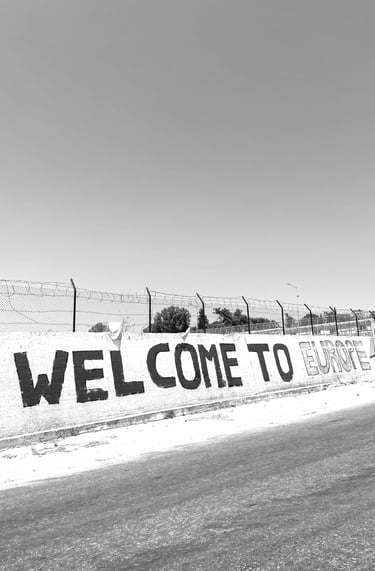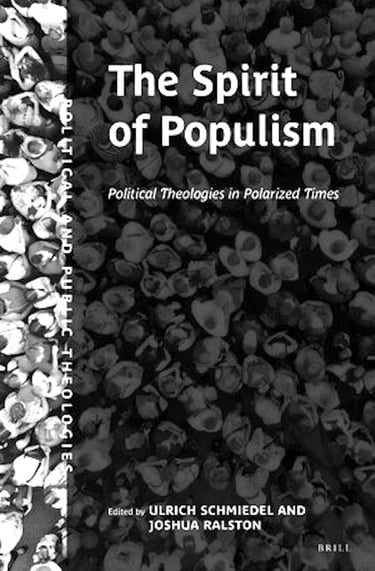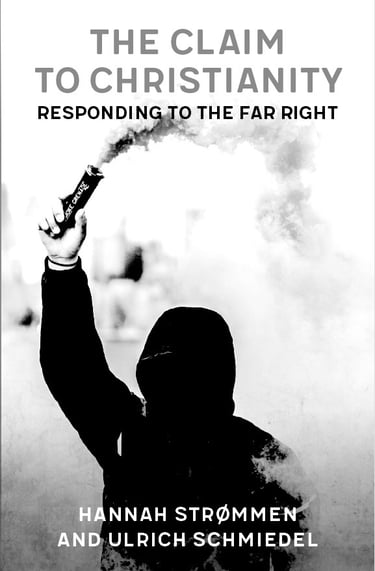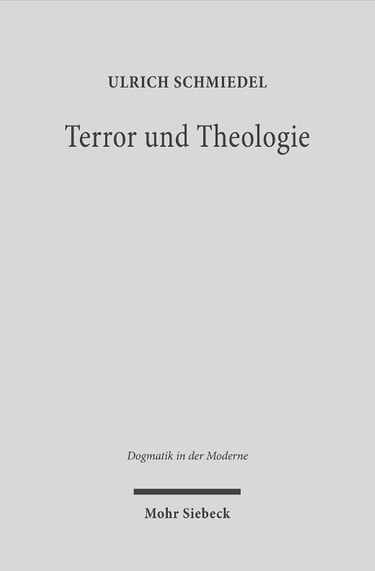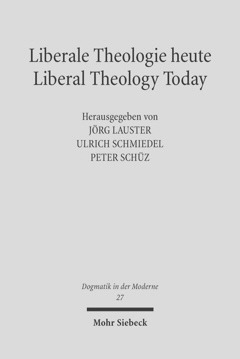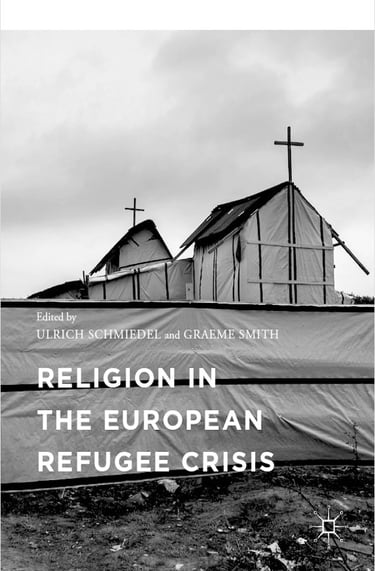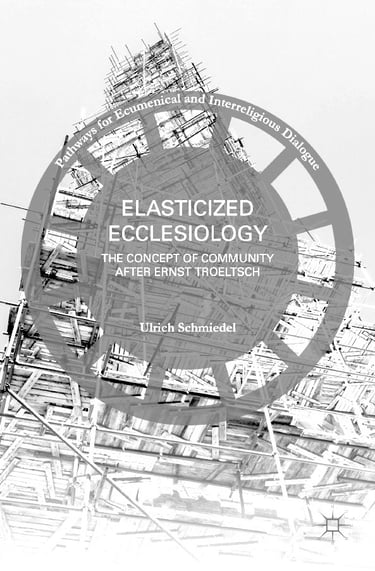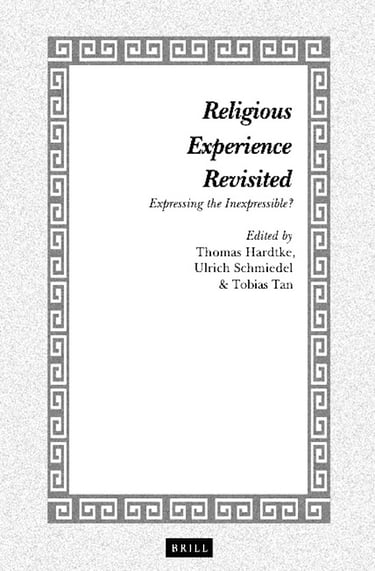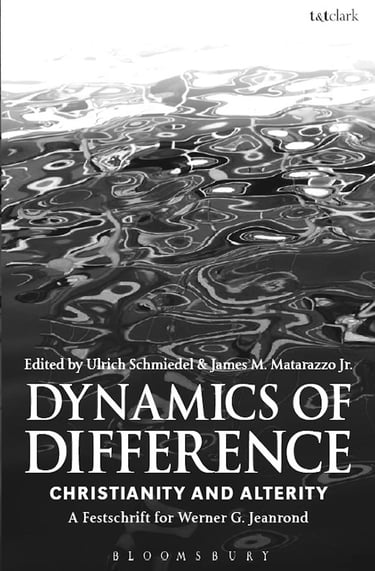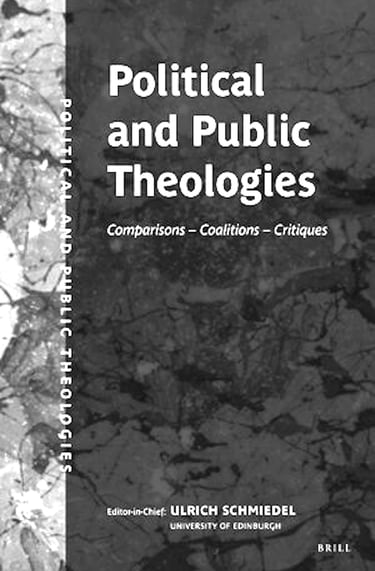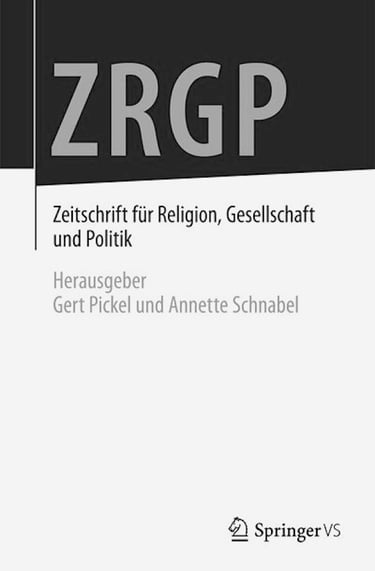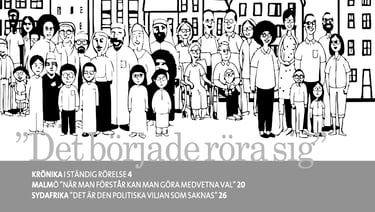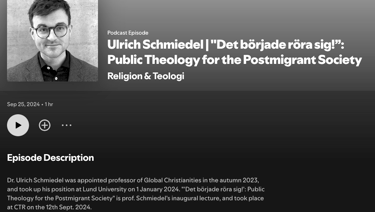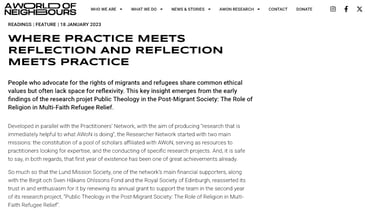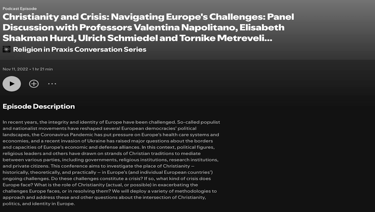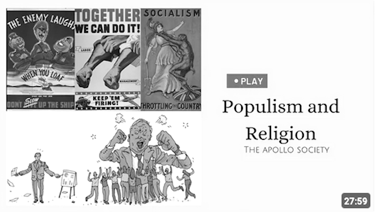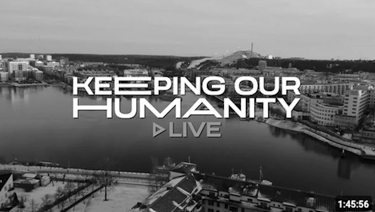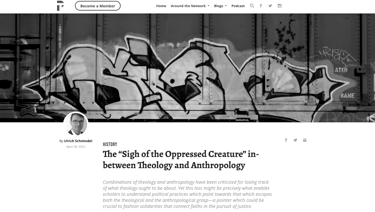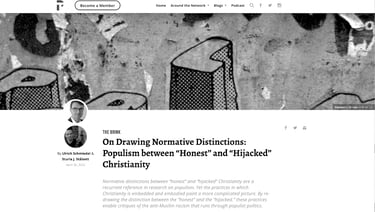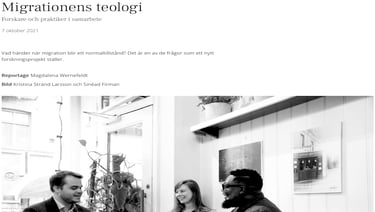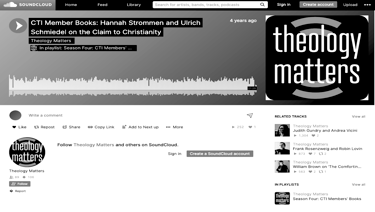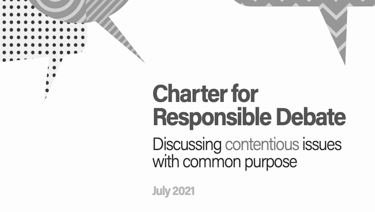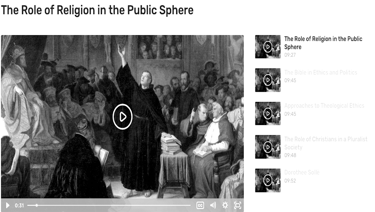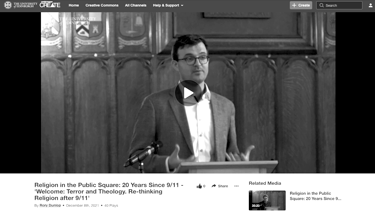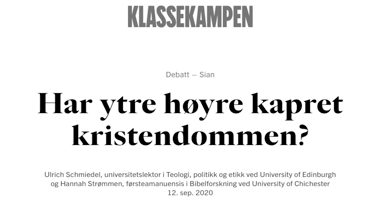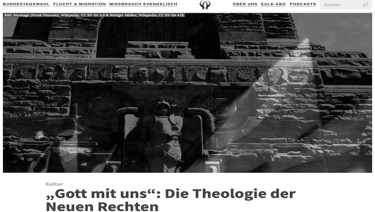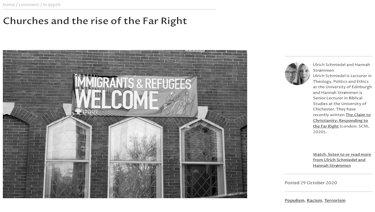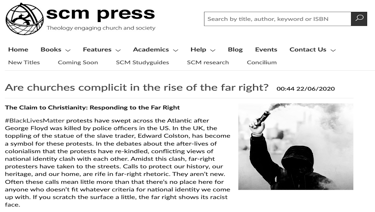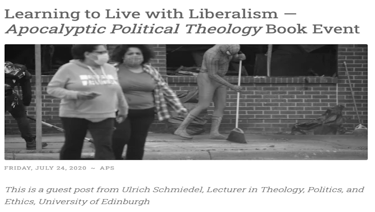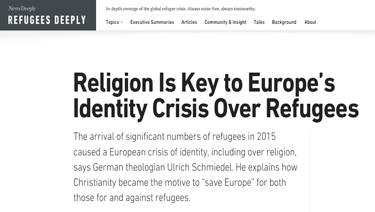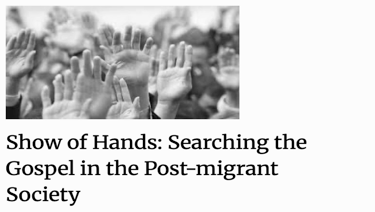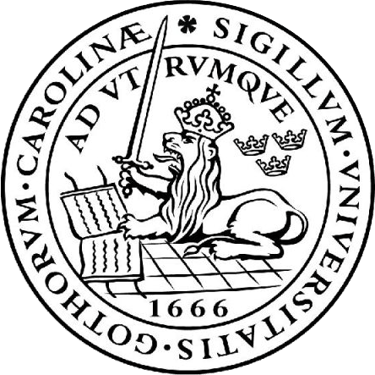Ulrich Schmiedel
Professor of Global Christianities
I’m Professor of Global Christianities at Lund University in Sweden. Specializing in public and political theology, I’m interested in the role of religions in the public square. Methodologically, my research is located at the intersection of theology with sociology, anthropology, and philosophy.
Profile
I’m Professor of Global Christianities at Lund University in Sweden where I hold a chair endowed by Lunds Missionssällskap.
Specializing in public and political theology, I'm interested in the role of religions in the public square, both their problems and their potentials for the challenges confronting contemporary societies. Methodologically, my research is located at the intersection of theology with sociology, anthropology, and philosophy.
I have worked on topics such as
comparative theology
faith-based activism
intra- and interreligious relations
Islamophobia
liberal theology
political and public theology
religion and (post)migration
religion and populism
religion and racialization
religion and the far right
theology of religions
Prior to my appointment at Lund, I was Lecturer and then Senior Lecturer in Theology, Politics, and Ethics at the University of Edinburgh in Scotland, where I also served as Co-Director of the Centre for Theology and Public Issues. I came to Edinburgh after a Lectureship in Systematic Theology at Ludwig-Maximilians-Universität München in Germany, where I completed my postdoctoral dissertation. I wrote my doctoral dissertation at the University of Oxford after studying theology, sociology, and hermeneutics.
Employment
since 2024: Professor of Global Christianities, Centre for Theology and Religious Studies, Lund University; 2022–2023: Senior Lecturer in Theology, Politics and Ethics, School of Divinity, University of Edinburgh; 2018–2022: Lecturer in Theology, Politics and Ethics, School of Divinity, University of Edinburgh; 2015–2018: Lecturer in Systematic Theology, Faculty of Theology, Ludwig-Maximilians-Universität München
Education
2021: Dr.Habil., Systematic Theology, Faculty of Theology, Ludwig-Maximilians-Universität München, awarded the Habilitationspreis in the Humanities by Münchener Universitätsgesellschaft; 2016: D.Phil., Theology, Faculty of Theology, University of Oxford; 2012: Dipl.Theol., Theology, Faculty of Theology, Universität Leipzig, awarded the Kurt-Nowak-Preis by Förderverein der Theologischen Fakultät, Universität Leipzig; 2010: M.Litt., Hermeneutics, School of Critical Studies, University of Glasgow
Experience
since 2024: Elected Member, Royal Society of Letters at Lund; since 2024: Elected Member, New Society of Letters at Lund; since 2024: Honorary Fellow, School of Divinity, University of Edinburgh; since 2023: Co-Chair, Religion and Migration Unit, American Academy of Religion; since 2020: Member, Royal Society of Edinburgh’s Young Academy of Scotland; 2022–2023: Co-Director, Centre for Theology and Public Issues, University of Edinburgh; since 2019: Fellow, Higher Education Academy UK (FHEA); 2019–2020: Co-Chair, Liberal Theologies Unit, American Academy of Religion; since 2017: Member, Center of Theological Inquiry, Princeton, NJ, USA; 2013–2015: PhD Scholar, Studienstiftung des deutschen Volkes; 2007–2012: Scholar and Hölderlin Scholar, Studienstiftung des deutschen Volkes
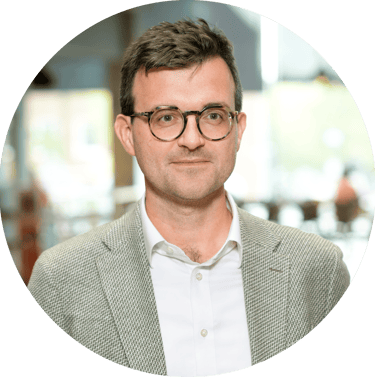

Faith-Based Refugee Relief in Europe: Connecting the Empirical and the Ethical (FABRIC). 2024–2029.
Funded by a European Research Council Starting Grant, FABRIC aims to understand and utilize the moral insights and the moral ideas that faith-based refugee relief organizations develop in practice for the cross-disciplinary debate about the ethics of forced migration in Europe.
Europe has been pushed to a social and political breaking point over migration. The fallout is a death toll that puts the border around the continent among the deadliest borders in the world. Faith-based organizations (FBOs) have been at the forefront of this challenge, preventing the collapse of infrastructures of care, combating racist discourse and religious discrimination. Yet there is very little knowledge about the refugee relief of these FBOs. FABRIC addresses this lack of research by conducting a comprehensive and comparative empirical exploration of FBOs, covering activities by FBOs from all three Abrahamic faiths in mono- and multi-religious settings across the continent. Countering the lack of interaction between empirical and evaluative approaches, FABRIC inquires into the conditions, constraints, and consequences of practicing justice. It offers a concrete account of faith-based refugee relief in order to formulate a concept of mobility justice that considers cross-connections between social, racial, and climate justice on regional, national, and global scales.
Governing Religious Diversity in the Global City (GORED). 2025–2028. Collaboration with Anna Hjälm (Jerusalem) and Sarojini Nadar (Cape Town).
Funded by Lunds Missionssällskap, his interdisciplinary project studies the governance of religious diversity in the global city from comparative, critical and constructive angles.
Countering the secularist concentration on statehood in national and international relations, this interdisciplinary project takes the global city as focus and field to study the governance of religious diversity. Global cities spaces of contestation and spaces of conversation about the place of religion in public and political life. Faith-based organizations mobilize and move in these spaces. With a particular focus on faith-based actors as forces that challenge or contribute to asymmetrical systems of power, this project analyzes and assesses how faith-based actors shape and are shaped by the governance of diversity through their explicit political and their implicit infra-political engagements with the city as a site for conflicts, conversations, and coalitions.
Christian-Muslim Political Theology: A Comparative Companion as a Foundation for New Research Agendas (COMCOM). 2024–2026. Co-operation with Fatima Tofighi (Bonn).
Funded by the Gingko Foundation’s Werner Mark Linz Memorial Grant, COMCOM aims to produce a comparative companion to Christian-Muslim political theology.
Comparative theology has emerged as a field of studies that makes sense of encounters between religions by connecting confessional and comparative approaches. However, there is a gap at the very foundations of comparative-theological scholarship on politics. COMCOM aims to fill this gap for Christian-Muslim political theology. Analyzing Muslim texts from the Middle East to make them accessible to Christian theologians and Christian texts from Europe to make them accessible to Muslim theologians, we aim to produce a two-volume comparative companion concentrating on classic and contemporary texts.
Public Theology for the Post-Migrant Society: The Role of Religion in Multi-Faith Refugee Relief (PTPS). 2021–2024. Co-operation with Ryszard Bobrowicz (Leuven).
Funded by Lunds Missionssällskap, PTPS explores the role of religion in the practices of A World of Neighbours, a multi-faith-based network engaging people on the move across Europe.
By examining the understanding and utilization of “religion” among the practitioners of A World of Neighbours, a multi-faith-based network engaging people on the move across Europe, PTPS addresses a lack of research on the impact of multi-faith cooperation on refugee relief. The project aims to conceptualize a multi-faith public theology for the post-migrant society that empowers practitioners from the three Abrahamic faiths to work together with people on the move, demonstrating the impact of faith-based initiatives on pluralist societies in Europe.
Welcoming the Stranger: Resources for a European Multi-Faith Ethics of Migration (WTS). 2021–2023. Collaboration with Ryszard Bobrowicz (Leuven) and Majbritt Lyck-Bowen (Winchester).
Funded by a Saltire Collaboration Grant from the Royal Society of Edinburgh together with the Birgit och Sven Håkan Ohlssons Fond, WTS brought together scholars and stakeholders concerned with faith-based refugee relief in Europe to develop practice-based resources for a multi-faith ethics of migration.
Through immersion in the work of the practitioners of A World of Neighbours, a multi-faith-based network engaging with people on the move across Europe, theologically-engaged scholars from Judaism, Christianity, and Islam investigated the significance of their theological traditions for a multi-faith ethics of migration in action, producing ethical guidelines for faith-based networks. Publications: Ryszard Bobrowicz, Anna Hjälm, and Ulrich Schmiedel (ed), Living in a World of Neighbours: Activists and Academics in Conversation about Multi-Faith Refugee Relief (Eugene, Or: Pickwick, forthcoming); Ulrich Schmiedel, What’s in a Handshake? Multi-Faith Practice as a Starting Point for Christian Migration Ethics, Studies in Christian Ethics 35/3 (2022), 561–583; A World of Neighbours, What Gudies Us (2023); A World of Neighbours, Religion Within A World of Neighbours (2023); A World of Neighbours, Creating Brave Spaces for Challenging Conversations (2023).
Islam’s Liberalisms and Liberalism’s Islams: Constructing a Contrast in a Paradigmatic Period (LIBISLA). 2018–2019. Collaboration with Tommy Lynch (Chichester), Hannah Strømmen (Chichester), and Fatima Tofighi (Qom)
Funded by the American Academy of Religion’s International Collaboration Grant, this project explored the construction of the assumption that Islam is in conflict with liberalism as much as liberalism is in conflict with Islam in the nineteenth- and twentieth-century study of religion.
Debates about religion inside and outside academia frequently assume that Islam is in conflict with liberalism as much as liberalism is in conflict with Islam. Our collaboration addresses the construction of this conflict in the nineteenth and twentieth centuries. Analyzing both Western and Eastern key figures from this paradigmatic period, we argue that they both construct and collapse this contrast which has been fundamental to global scholarship on religion ever since. Publications: Tommy Lynch, Hegel, Islam, and Liberalism: Religion and the Shape of World History, Philosophy and Social Criticism 47/2 (2020), 225–240; Ulrich Schmiedel, Supremacy Smugglers? Islam in the Legacy of Theological Liberalism, Journal of the American Academy of Religion 89/2 (2021), 644–671; Fatima Tofighi, The Prophetic and the Limitation of Authority in Modernist Islam, Political Theology 21/1–2 (2020), 126–141.
A complete list of projects is available here.
Projects
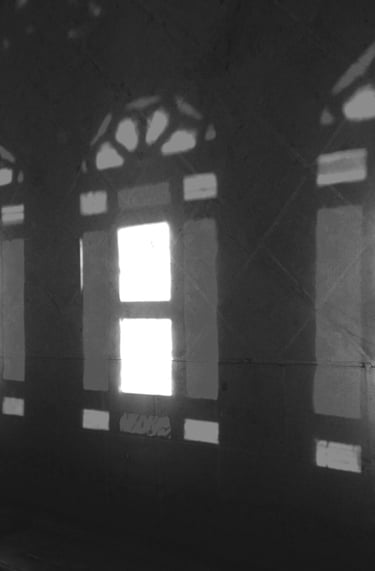

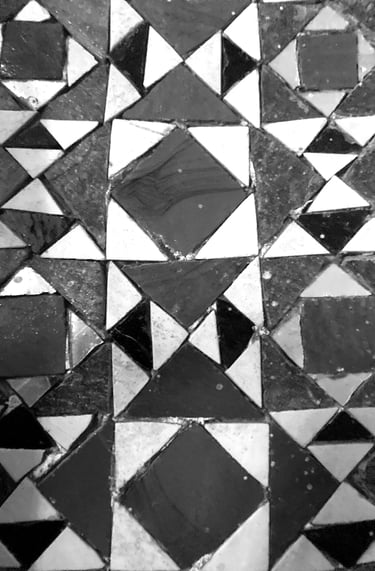





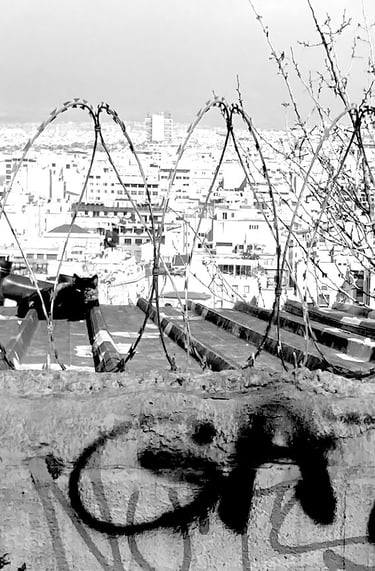

Religion in the Public Square: Revisiting 9/11. Special Section of the Zeitschrift fur Religion, Gesellschaft und Politik 7 (2023).
Studies on 9/11 could fill a library. The contributions to this special section – written by Farid Hafez, Hannah Strømmen, Jayne Svenungsson, Atalia Omer, and Ulrich Schmiedel – suggest that 9/11 is not necessarily the watershed between a pre- and a post-9/11 order that politicians and pundits continue to write about. Instead, the attacks have served as a catalyst for trends and trajectories in the global governance of religion that continue to have a significant impact today. Returning to 9/11, then, the contributions take stock of these trends and trajectories in order to chart new ways of engaging with religion in the public square.
The Spirit of Populism: Political Theologies in Polarized Times, Political and Public Theologies: Comparisons – Coalitions – Critiques, Leiden: Brill, 2022, xiv + 334. Co-edited with Joshua Ralston.
Populism is a buzzword. This compilation explores the significance of religion for the controversies stirred up by populist politics in European and American contexts in order to understand what lies behind the buzz. Engaging Jewish, Christian, and Islamic political thought and theology, contributions by more than twenty established and emerging scholars explore right-wing and left-wing protests, offering critical interpretations and creative interventions for a polarized public square. Both methodologically and thematically, the compilation moves beyond essentialist definitions of religion, encouraging a comparative approach to political theology today.
Reviews: Andrew Stone Porter, in: Journal of the Society of Christian Ethics 44/1 (2024), 201–202; Marius Timmann Mjaaland, in: Journal of Contemporary Religion 39/2 (2024), 368–370; Michael Hoelzl, in: Theologische Reveue 119 (2023).
The Claim to Christianity: Responding to the Far Right, London: SCM, 2020, viii + 203. Co-authored with Hannah Strømmen.
The far right is on the rise across Europe, pushing a battle scenario in which Islam clashes with Christianity as much as Christianity clashes with Islam. Ulrich Schmiedel and Hannah Strømmen examine the theologies that emerge in the far right across Europe, concentrating on Norway, Germany, and Great Britain. They explore how churches in these three countries have been complicit, complacent, or critical of the far right. Ultimately, Schmiedel and Strømmen encourage a creative and collaborative theological response. To counter the far right, Christianity needs to be practiced in an open and open-ended way which calls Christians into contact with Muslims.
The Church, the Far Right, and the Claim to Christianity, ed. Helen Paynter and Maria Power (London: SCM, 2024) features responses from practitioners.
Reviews: Stephen Waldron, in: Theology and Society 3 (2022); Doug Gay, in: Theology in Scotland 29 (2022), 87–90; Carol Wardman, in: Crucible: The Journal of Christian Social Ethics 3 (2022), 50–53; Stephen Roberts, in: International Journal of Public Theology 15 (2021), 293–300; Simon Jones, in: The Centre for Muslim-Christian Studies Oxford (2021); Elisabeth Gerle, in: Svensk Teologisk Kvartalskrift 2 (2021), 197–199; Robin Gill, in: Theology 124/5 (2021), 398; Chamsy el-Ojeili, in: Counterfutures 11 (2021), 76–99; Peter Selby, in: Church Times 6/11 (2020).
Terror und Theologie. Der religionstheoretische Diskurs der 9/11-Dekade, Dogmatik in der Moderne, Tübingen: Mohr Siebeck, 2021, xii + 436.
At least since the attacks of 9/11, religion has been met with suspicion. In this study, Ulrich Schmiedel investigates how political theologians in the UK and the US responded to the terror attacks. The friend-foe distinction, formulated by the German legal and political scholar Carl Schmitt, emerges as a core category in the controversy about liberal and post-liberal theories of religion, stirred up among defenders and despisers of the Global War on Terror. Building on Dorothee Sölle’s political theology, Schmiedel draws them into a conversation with Muslim scholars of religion. Ultimately, he develops the contours of a coalitional and comparative political theology for pluralist societies today.
Reviews: Lia Alessandro, in: Ethik und Gesellschaft 1 (2023), Katja Ekman, in: Svensk Teologisk Kvartalskrift 2 (2023), 203–205; Fatima Tofighi, in: Studies in Religion/Sciences Religieuses 52/2 (2022), 299–300; Paul Schroffner SJ, in: Zeitschrift für Theologie und Philosophie 144/3 (2022); Marco Hofheinz, in: Theologische Revue 118/5 (2022).
Liberale Theologie heute – Liberal Theology Today, Dogmatik in der Moderne, Tübingen: Mohr Siebeck, 2019, viii + 401. Co-edited with Jörg Lauster and Peter Schüz.
The label “liberal theology” is associated with theologies in nineteenth-century Germany which aimed to mediate between modernity and Christianity. But soon liberal theology advanced nationally and internationally. It remains a significant factor in the theological landscape to this day. Taking stock of the development of liberal theology past and present, this volume maps contemporary challenges and chances of the programme of liberal theology to investigate what its future potential for Christianity might be.
Reviews: Clive Marsh, in: Theological Studies 74/1 (2023), 436–438.; Johannes Zachhuber, in: The Journal of Ecclesiastical History (2021), 457–459; Arie L. Molendijk, in: NTT Journal of Theology and the Study of Religion 75 (2021), 143–144; Julius Trugenberger, in: Theologische Literaturzeitung 145 (2020), 1003–1005.
Religion in the European Refugee Crisis, Religion and Global Migrations, New York: Palgrave Macmillan, 2018, xvii + 314. Co-edited with Graeme Smith.
This book explores the roles of religion in the current refugee crisis of Europe. Combining sociological, philosophical, and theological accounts of what is commonly considered a crisis, renowned scholars from across Europe examine how religion has been employed to call either for eliminating or for enforcing the walls around “Fortress Europe”. Religion, they argue, is radically ambiguous, simultaneously causing social conflict and social cohesion in times of turmoil. Charting the constellations, the conflicts, and the consequences of the current refugee crisis, this book thus answers the need for succinct but sustained accounts of the intersections of religion and migration.
Reviews: Osman Ülker, in: Insight Turkey 23/1 (2021), 227–237; Lucy Schouten, in: Reviews in Religion and Theology 27 (2020), 290–292; Amy Casteel, in: Tijdschrift Voor Theologie 3 (2019), 302–303; Fleur Houston, in: Reform Magazine 3 (2019).
Elasticized Ecclesiology: The Concept of Community after Ernst Troeltsch, Pathways for Ecumenical and Interreligious Dialogue, New York: Palgrave Macmillan, 2017, xiv + 312.
This study confronts the current crisis of churches. In critical and creative conversation with the German theologian Ernst Troeltsch (1865-1923), Ulrich Schmiedel argues that churches need to be “elasticized” in order to engage the other. Examining contested concepts of religiosity, community, and identity, Schmiedel explores how the closure of church against the sociological other corresponds to the closure of church against the theological other. Taking trust as a central category, he advocates for a turn in the interpretation of Christianity—from “propositional possession” to “performative project”. Eventually, church emerges as a “work in movement”, continually constituted through encounters with the sociological and the theological other.
Review: Arie L. Molendijk, in: NTT Journal for Theology and the Study of Religion 73 (2019), 56–57.
Religious Experience Revisited: Expressing the Inexpressible?, Studies in Theology and Religion, Leiden/Boston: Brill, 2016, xi + 281. Co-edited with Thomas Hardtke and Tobias Tan.
Religious Experience Revisited explores a dilemma which has haunted the study of religion since William James. Is religion rooted in experiences? Is religion rooted in expressions? How are experiences and expressions related? The contributors to this international and interdisciplinary compilation explore the possibilities and the impossibilities of a hermeneutics of religion. Combining theology and philosophy with biblical, cultural, historical, and literary studies, they examine how religious experiences and religious expressions have been entangled in the past and in the present. These entanglements call for interdisciplinary conversations in which those who study experiences and those who study expressions can learn from each other in order to carve out important and instructive spaces for the study of religion.
Dynamics of Difference: Christianity and Alterity. A Festschrift for Werner G. Jeanrond, London: Bloomsbury T&T Clark, 2015, xv + 310. Co-edited with James M. Matarazzo, Jr.
Who is my other? What do I encounter when I encounter my other? And what responses and responsibilities does the encounter with my other evoke? Grappling with questions like these, the contributions to this compilation analyse alterity in the Bible, alterity in philosophy, alterity in theology, alterity in interreligious dialogues, and the radical alterity of God. This Festschrift in honour of Werner G. Jeanrond investigates the challenge of alterity for Christianity, exploring and elaborating on this core concern in Jeanrond’s hermeneutical theology. Blurring disciplinary boundaries, more than thirty of Jeanrond’s colleagues and companions from ten countries track the dynamics of difference driven by the encounter with the self as other, the other as other, and God as the radical other. Tying in with Jeanrond’s explorations of the many faces and facets of the other, this Festschrift ultimately aims to advocate openness to the other as a necessity for both religion and reflections on religion.
Reviews: David Olali, in: Reading Religion 9 (2020); Oliver James Keenan, In: New Blackfriars 97 (2016), 514–517; Daniel Cosacchi, in: The Journal of Theological Studies 67 (2016), 886–888.
Political and Public Theologies: Comparisons – Coalitions – Critiques. Leiden/Boston: Brill, since 2021. Editor-in-Chief: Ulrich Schmiedel.
The peer-reviewed book series Political and Public Theologies: Comparisons – Coalitions – Critiques (PPT) seeks to provide a forum for critical and constructive engagements with the significance of theologies for the public square. Connecting the increasingly interdisciplinary fields of political and public theology, the series is interested in the impact that theologies have on public issues and the impact that public issues have on theologies, both theoretically and practically. PPT invites publications from established and emerging scholars that engage with the significance of theologies for the public square from (1) comparative angles that facilitate inter-religious studies, (2) coalitional angles that foster inter-religious solidarities, and (3) critical angles that re-formulate theology as a resource for contemporary controversies.

